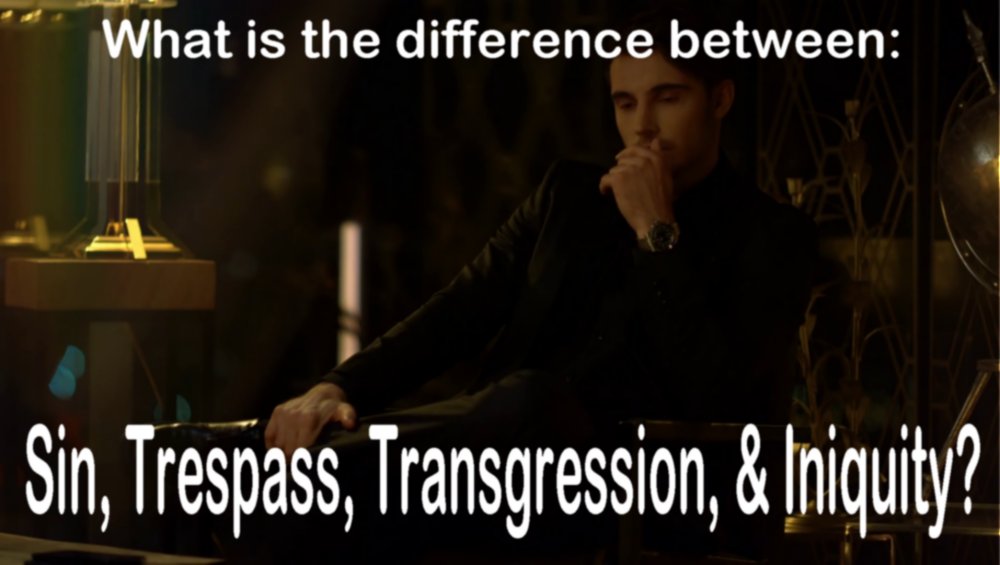I believe this person simply went to their favorite “attack the Bible” website such as the Skeptics Annotated Bible site or some other site; and just copy and pasted some of the alleged contradictions listed there. I say this for two reasons. First, because they were able to Tweet them so quickly. They either went to the site, or had already been there to copy and save them, hoping for the opportunity to jump on someone with them. The second reason is I don’t think they actually read what these passages say. If they had, perhaps they would not have been so quick to claim their examples were contradictions.
Now then, let’s take a look at this person’s alleged contradictions:
“I the LORD thy God am a jealous God, visiting the iniquity of the fathers upon the children unto the third and fourth generation…” — Exodus 20:5
Response: When reading the Bible, it is important to avoid “Cherry Picking,” that is, taking verses out of context in such a way as to try and make them say something which they did not actually say. Cherry picking is what is happening here (and in most of the alleged contradictions in this post).
In Exodus 20:5 we read that God “visits” the iniquity of the fathers upon the children…” The term “iniquity” as used here means suffering as a consequence for iniquity. Certainly the fathers will suffer for their iniquity, and so will their families. The fathers will receive punishment. The children will not receive punishment, but will still suffer as a direct consequence for their father’s iniquity. With regard to Exodus 20:5, the iniquity is the premeditated worship of a false god, which is punishable by death. With their father gone, who will support the children? Who will care for the children? This instant poverty that the children are thrust into because of their father’s iniquity will cause them untold suffering, and will force the family into poverty for several generations.
The person making the allegation of contradiction failed to read the context of the passages; and failed to understand, or make an effort to understand, the meaning of key words in the passage. There is no contradiction here.
“…if ye be circumcised, Christ shall profit you nothing.” — Galatians 5:2
Response: What was the purpose of circumcision in the Old Testament? Genesis 17:10 gives a partial answer, it was a sign of the covenant the Lord had with Abraham and his physical and spiritual descendants. But what is the covenant about? It is between God and those who love Him and have their salvation in and through Him. It was an outward sign of an inner faith in God. This is explained in Romans 4:9-13. In Deuteronomy 10:12-16 we read that the physical act of circumcision is of no value, while the spiritual aspects of circumcision are of great value and importance. Again, circumcision is an outward sign of an inner faith in God.
In the New Testament, physical circumcision is not necessary for those who have faith in God, because we are in Christ Jesus, His circumcision is valid for all believers. We read about this in Colossians 2:9-14.
In Galatians 5:2-6 we read that because believers are circumcised in Christ, there is no need for a physical circumcision – a second circumcision if you will; and, in the case of believers, obtaining a physical circumcision displays a server lack of faith in Jesus Christ, and thus negates the circumcision believers have in Christ, and leave the person with no benefit whatsoever while requiring them to keep the entirety of the Old Testament law.
Again, the person making the allegation of a contradiction here has failed to fully read and understand the Scriptures concerning circumcision. There is no contradiction here.
“…ye resist not evil: but whosoever shall smite thee on the right cheek, turn to him the other also.”
Response: The person making the claim of a contradiction here, has cherry picked certain phrases within a larger passage, and used them to formulate a conclusion. This person has failed to even include the complete verses they are quoting!
In the first passage, Exodus 21:23-25, we read the following (verse 22 is included for context):
22 “If men struggle with each other and strike a woman with child so that she gives birth prematurely, yet there is no injury, he shall surely be fined as the woman’s husband may demand of him, and he shall pay as the judges decide. 23 But if there is any further injury, then you shall appoint as a penalty life for life, 24 eye for eye, tooth for tooth, hand for hand, foot for foot, 25 burn for burn, wound for wound, bruise for bruise. (NASB)
This passage is part of a larger passage beginning around verse 12, which discusses the death penalty in Old Testament Jewish Law. As we see in Exodus 21:22-25, the situation is one where a pregnant woman is struck by a man, and the blow causes the death of the unborn baby. In such a situation the Lex Talionis (Life for a Life principle) is implemented and the death penalty imposed.
In the second passage, Matthew 5:39, we read, “39 But I say to you, do not resist an evil person; but whoever slaps you on your right cheek, turn the other to him also.” (NASB)
This too is part of a larger passage, namely Matthew 5:38-48 (which I am not going to reproduce here due to space constraints). In Matthew 5:39 we read about an evil person who seeks to wrong you. And indeed all of verses 38-48 address this same issue. Please note that this is not the same issue as is addressed in Exodus 21:22-25. In the first the issue is murder, and the law’s response to murder. In the second the issue is someone being mean to you, and the Lord’s command in this type of situation is to not take vengeance yourself, but instead to treat them in a Christlike manner.
“…The LORD was with Judah; and he drave out the inhabitants of the mountain; but could not drive out the inhabitants of the valley, because they had chariots of iron.” — Judges 1:19
Response: Once again the individual making the claim of a contradiction here is cherry picking phrases out of certain passages in order to support their claim. And, once again they have failed to understand the passages and phrases they are using. In the first passage, Matthew 19:26, Jesus is indeed reiterating the sovereignty of God. The second passage, Judges 1:19, however, is not talking about what God can or cannot do. It simply states that God was with Judah, not what God could or could not do. The verse and the verses surrounding it, talk about Judah and his men being unable to drive out the inhabitants of the valley.
Once again, the person making the claim has failed to understand what is being stated here, and once again, there is no contradiction.
[In Judges, though, the tale of Jephthah, who led the Israelites against the Ammonoites, is being told. Being fearful of defeat,
“when I return in peace from the children of Ammon, shall surely be the LORD’s, and I will offer it up for a burnt offering” — Judges 11:30-31
[The terms were acceptable to god — remember, he is supposed to be omniscient and know the future — so he gave victory to Jephthah, and the first whatsoever that greeted him upon his glorious return was his daughter, as god surely knew would happen, if god is god. True to his vow, the general made a human sacrifice of his only child to god!] — Judges 11:29-34
Response: The general point of this alleged contradiction is God forbids human sacrifice, and Jephthah “made a human sacrifice of his only child to god!” I have two points to make about this claim. First, Scripture records numerous instances of people violating God’s Law. Simply because God forbids something, and later Scripture records someone breaking God’s Law by doing that which was forbidden, is not a contradiction, and it is a huge stretch to claim it is, and it also involves redefining the word “contradiction” in order to make it fit your claim.
Second, Jephthah did not make a human sacrifice of his only child.. She became a temple worker for the rest of her life, unable to marry and thus remaining a virgin. And, it is important to note that she voluntarily chose to acquiesce to her father’s decision. She could have run away, she could have pleaded with her father to not send her away, there were all manner of things she could have done to avoid spending the rest of her life in the temple, but she didn’t. She knew she wasn’t going to be put to death, and that she would remain safe, and thus went voluntarily.
Again, no contradiction.
“No man hath seen God at any time…”– John 1:18
Response: The person claiming this is a contradiction has failed to notice the distinction in the sense in which God is either seen or unseen. This is due to their failure to read the context of the passages, and instead relying on cherry picked verses, and portions of verses.
In one sense it is possible to see God, and that is when He takes on a physical representation. Whether appearing as a man, or a column of smoke or fire, or a burning bush, etc. It is also possible to see God if He appears in a physical representation in a dream or vision.
In the other sense, it is impossible to see God as He actually is, in His actual form, because He is an invisible Spirit. He exists on a different plane of existence, and so cannot be seen by anyone at anytime.
Both verses are correct, and there is no contradiction.
“… the elements shall melt with fervent heat, the earth also and the works that are therein shall be burned up.” — 2Peter 3:10
Response: Once again the person claiming this is a contradiction has failed to include the complete verses, failed to understand the text, misrepresented the passages, and cherry picked portions of verses to support their claims.
Ecclesiastes 1:4 is correct in saying the Earth will last forever. Please note it does not say what condition it will be in, only that it will last forever.
2 Peter 3:10 states that the Earth will melt with heat, and the things on the earth will be burned up. Please note that it says nothing about the Earth not lasting forever.
In failing to recognize this – whether intentionally or unintentionally – has served to create a false contradiction where no contradiction exists. If the person had looked at the context, i.e. what the Bible says about the Earth; they would have perhaps learned that the Earth started as a formless void created by God. At a specific point in time, the Earth will become nothing more than a bald rock floating in space. Still existing, but with nothing on it. The Earth will then be re-populated with flora and fauna by the Word of the Lord, and a re-created heaven will come down and reside on earth, and believers will live there for the remainder of eternity. There is a lot more to this of course, but in a nut shell this is exactly what will happen to the Earth.
It will last for the remainder of eternity.
There is no contradiction here.
“One man esteemeth one day above another: another esteemeth every day alike. Let every man be fully persuaded in his own mind.” — Romans 14:5
Response: Exodus 20:8 is God’s command to remember the Sabbath, the Day of Rest, and keep it holy. In other words, a day dedicated to the Lord where no work is done, other than work for the Lord. Romans 14:5 states that one man holds one day above another, and another man looks at all days the same. It then gives the command from God to “let every man be fully persuaded in his own mind.” It says nothing about the Sabbath Day of Rest whatsoever.
Since the two verses don’t have much of anything in common, there is no contradiction.




 RSS Feed
RSS Feed
